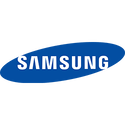
Samsung to Also Showcase 280-layer 3D QLC NAND Flash, 32 Gbit DDR5-8000 Memory Chips at IEEE-SSCC
In addition to the 37 Gbps GDDR7 memory, Samsung Electronics prepares to showcase several other memory innovations at the 2024 IEEE-SSCC as compiled by VideoCardz. To begin with, the company is showcasing a new 280-layer 3D QLC NAND flash memory in the 1 Tb density, enabling next generation of mainstream SSDs and smartphone storage. This chip offers an areal density of 28.5 Gb/mm², and a speed of 3.2 GB/s. To put this into perspective, the fastest 3D NAND flash types powering the current crop of flagship NVMe SSDs rely on 2.4 GB/s of I/O data rates.
Next up, is a new generation DDR5 memory chip offers data rates of DDR5-8000 with a density of 32 Gbit (4 GB). This chip uses a symmetric-mosaic DRAM cell architecture, and is built on a 5th generation 10 nm class foundry node Samsung optimized for DRAM products. What's impressive about this chip is that it will allow PC memory vendors to build 32 GB and 48 GB DIMMs in single-rank configuration with DDR5-8000 speeds; as well as 64 GB and 96 GB DIMMs in dual-rank configuration (impressive, provided your platform can play well with DDR5-8000 in dual-rank).
Next up, is a new generation DDR5 memory chip offers data rates of DDR5-8000 with a density of 32 Gbit (4 GB). This chip uses a symmetric-mosaic DRAM cell architecture, and is built on a 5th generation 10 nm class foundry node Samsung optimized for DRAM products. What's impressive about this chip is that it will allow PC memory vendors to build 32 GB and 48 GB DIMMs in single-rank configuration with DDR5-8000 speeds; as well as 64 GB and 96 GB DIMMs in dual-rank configuration (impressive, provided your platform can play well with DDR5-8000 in dual-rank).
















































